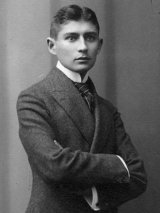The Trial Page #8
The Trial is a novel written by Franz Kafka between 1914 and 1915 and published posthumously on 26 April 1925. One of his best-known works, it tells the story of Josef K., a man arrested and prosecuted by a remote, inaccessible authority, with the nature of his crime revealed neither to him nor to the reader. Heavily influenced by Dostoevsky's Crime and Punishment and The Brothers Karamazov, Kafka even went so far as to call Dostoevsky a blood relative. Like Kafka's other novels, The Trial was never completed, although it does include a chapter which appears to bring the story to an intentionally abrupt ending.
There was a series of loud, curt and regular knocks at the door of the adjoining room. Miss Bürstner went pale and laid her hand on her heart. K. was especially startled, as for a moment he had been quite unable to think of anything other than the events of that morning and the girl for whom he was performing them. He had hardly pulled himself together when he jumped over to Miss Bürstner and took her hand. "Don't be afraid," he whispered, "I'll put everything right. But who can it be? It's only the living room next door, nobody sleeps in there." "Yes they do," whispered Miss Bürstner into K.'s ear, "a nephew of Mrs. Grubach's, an captain in the army, has been sleeping there since yesterday. There's no other room free. I'd forgotten about it too. Why did you have to shout like that? You've made me quite upset." "There is no reason for it," said K., and, now as she sank back onto the cushion, kissed her forehead. "Go away, go away," she said, hurriedly sitting back up, "get out of here, go, what is it you want, he's listening at the door he can hear everything. You're causing me so much trouble!" "I won't go," said K., "until you've calmed down a bit. Come over into the other corner of the room, he won't be able to hear us there." She let him lead her there. "Don't forget," he said, "although this might be unpleasant for you you're not in any real danger. You know how much esteem Mrs. Grubach has for me, she's the one who will make all the decisions in this, especially as the captain is her nephew, but she believes everything I say without question. What's more, she has borrowed a large sum of money from me and that makes her dependent on me. I will confirm whatever you say to explain our being here together, however inappropriate it might be, and I guarantee to make sure that Mrs. Grubach will not only say she believes the explanation in public but will believe it truly and sincerely. You will have no need to consider me in any way. If you wish to let it be known that I have attacked you then Mrs. Grubach will be informed of such and she will believe it without even losing her trust in me, that's how much respect she has for me." Miss Bürstner looked at the floor in front of her, quiet and a little sunk in on herself. "Why would Mrs. Grubach not believe that I've attacked you?" added K. He looked at her hair in front of him, parted, bunched down, reddish and firmly held in place. He thought she would look up at him, but without changing her manner she said, "Forgive me, but it was the suddenness of the knocking that startled me so much, not so much what the consequences of the captain being here might be. It was all so quiet after you'd shouted, and then there was the knocking, that's was made me so shocked, and I was sitting right by the door, the knocking was right next to me. Thank you for your suggestions, but I won't accept them. I can bear the responsibility for anything that happens in my room myself, and I can do so with anyone. I'm surprised you don't realise just how insulting your suggestions are and what they imply about me, although I certainly acknowledge your good intentions. But now, please go, leave me alone, I need you to go now even more than I did earlier. The couple of minutes you asked for have grown into half an hour, more than half an hour now." K. took hold of her hand, and then of her wrist, "You're not cross with me, though?" he said. She pulled her hand away and answered, "No, no, I'm never cross with anyone." He grasped her wrist once more, she tolerated it now and, in that way, lead him to the door. He had fully intended to leave. But when he reached the door he came to a halt as if he hadn't expected to find a door there, Miss Bürstner made use of that moment to get herself free, open the door, slip out into the hallway and gently say to K. from there, "Now, come along, please. Look," she pointed to the captain's door, from under which there was a light shining, "he's put a light on and he's laughing at us." "Alright, I'm coming," said K., moved forward, took hold of her, kissed her on the mouth and then over her whole face like a thirsty animal lapping with its tongue when it eventually finds water. He finally kissed her on her neck and her throat and left his lips pressed there for a long time. He did not look up until there was a noise from the captain's room. "I'll go now," he said, he wanted to address Miss Bürstner by her Christian name, but did not know it. She gave him a tired nod, offered him her hand to kiss as she turned away as if she did not know what she was doing, and went back into her room with her head bowed. A short while later, K. was lying in his bed. He very soon went to sleep, but before he did he thought a little while about his behaviour, he was satisfied with it but felt some surprise that he was not more satisfied; he was seriously worried about Miss Bürstner because of the captain.
Translation
Translate and read this book in other languages:
Select another language:
- - Select -
- 简体中文 (Chinese - Simplified)
- 繁體中文 (Chinese - Traditional)
- Español (Spanish)
- Esperanto (Esperanto)
- 日本語 (Japanese)
- Português (Portuguese)
- Deutsch (German)
- العربية (Arabic)
- Français (French)
- Русский (Russian)
- ಕನ್ನಡ (Kannada)
- 한국어 (Korean)
- עברית (Hebrew)
- Gaeilge (Irish)
- Українська (Ukrainian)
- اردو (Urdu)
- Magyar (Hungarian)
- मानक हिन्दी (Hindi)
- Indonesia (Indonesian)
- Italiano (Italian)
- தமிழ் (Tamil)
- Türkçe (Turkish)
- తెలుగు (Telugu)
- ภาษาไทย (Thai)
- Tiếng Việt (Vietnamese)
- Čeština (Czech)
- Polski (Polish)
- Bahasa Indonesia (Indonesian)
- Românește (Romanian)
- Nederlands (Dutch)
- Ελληνικά (Greek)
- Latinum (Latin)
- Svenska (Swedish)
- Dansk (Danish)
- Suomi (Finnish)
- فارسی (Persian)
- ייִדיש (Yiddish)
- հայերեն (Armenian)
- Norsk (Norwegian)
- English (English)
Citation
Use the citation below to add this book to your bibliography:
Style:MLAChicagoAPA
"The Trial Books." Literature.com. STANDS4 LLC, 2025. Web. 23 Feb. 2025. <https://www.literature.com/book/the_trial_1052>.








Discuss this The Trial book with the community:
Report Comment
We're doing our best to make sure our content is useful, accurate and safe.
If by any chance you spot an inappropriate comment while navigating through our website please use this form to let us know, and we'll take care of it shortly.
Attachment
You need to be logged in to favorite.
Log In